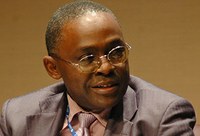 Romain Murenzi, who was born in Rwanda and raised in Burundi, earned a bachelor's degree in mathematics from the University of Burundi (1982), and a master's degree (1986) and doctorate degree (1990) in physics from the Catholic University of Louvain in Belgium.
Romain Murenzi, who was born in Rwanda and raised in Burundi, earned a bachelor's degree in mathematics from the University of Burundi (1982), and a master's degree (1986) and doctorate degree (1990) in physics from the Catholic University of Louvain in Belgium.
In 1990, he was named a postdoctoral researcher at the European Center for Advanced Training and Research in Scientific Computation (CERFACS) in Toulouse, France. Two years later, he moved to the United States to become a principal investigator at the Clark Atlanta University Center for Theoretical Studies of Physical Systems in Georgia. In 1993, he was named an associate professor of physics and, in 1999, he was selected chair of the physics department. One year later, he became a full professor.
Murenzi's research has focused on applications of multidimensional continuous wavelet transforms to quantum mechanics, and image and video processing.
In 2001, Rwanda's President Paul Kagame appointed Murenzi minister of education, science, technology and scientific research, and, in 2006, minister of science, technology and information and communication technologies. As minister, Murenzi contributed to the expansion and modernization of Rwanda's education system and the building of the country's scientific and technological capacity.
Over the past decade, Rwanda overcame its war-torn past to become a model for science-based development in sub-Saharan Africa. Rwanda now spends 1.6% of its gross domestic product on science and technology, a level that is expected to rise to 3% over the next five years. Its national economy, moreover, grew at an annual rate of nearly 7% a year between 1998 and 2008. More than 95% of its 2.5 million school-age children are now enrolled in elementary school.
Murenzi has travelled extensively both as a researcher and public official, forging partnerships in the areas of education, science and technology. He has worked with universities, research centres and ministries worldwide.
In 2009, Murenzi left Rwanda to become a senior scholar at AAAS in Washington, DC. In July 2010, he was named director of the AAAS Center for Science, Technology and Sustainable Development. As part of AAAS's International Office, the centre focuses on issues related to science-based sustainable development, especially in the developing world. Over the past two years, he has also been a visiting professor at the University of Maryland's Institute of Advanced Computer Studies in the United States.
Murenzi, who was elected a member of TWAS in 2005, has served as vice president of TWAS for Africa. He is also a member of the board of the African Institute of Mathematical Sciences (AIMS) and Dian Fossey Gorilla Fund International, on the advisory board of Scientists Without Borders, and on the scientific board of UNESCO's International Basic Science Programme.
"Professor Murenzi's successful career as a researcher, teacher and high-level administrator and policy official make him an excellent choice for the executive director of TWAS," says the Academy's president Jacob Palis. "We believe that Professor Murenzi has the skills and experience to lead the secretariat in the years ahead as TWAS seeks to expand its efforts to build scientific and technological capacity in all developing countries."

